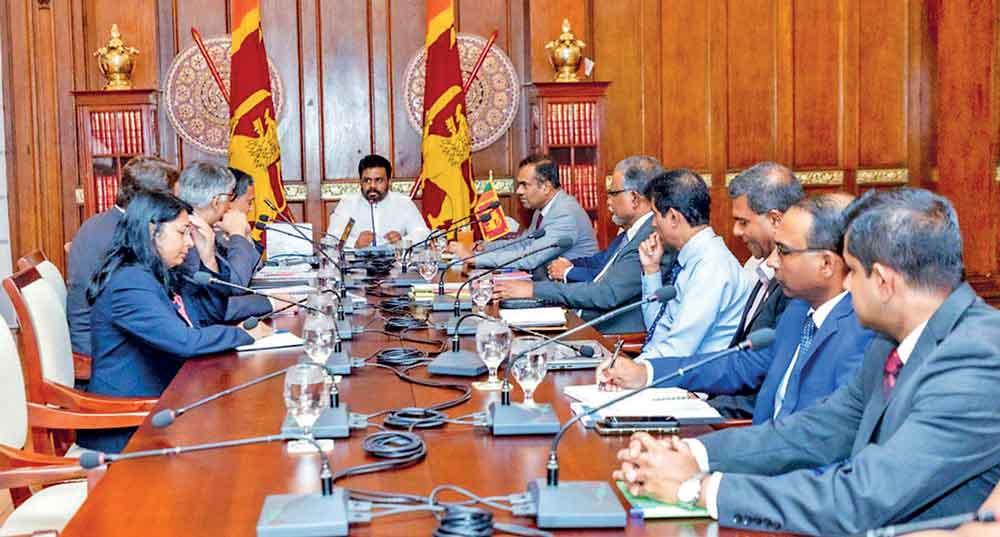Reply To:
Name - Reply Comment

President Anura Kumara Dissanayake holds discussions with the IMF Mission delegation in Colombo
| The absence of strong and independent minority representation can be seen in some of the more cosmetic actions taken by the government which in their minds might be a worthwhile endeavour |
| The NPP’s open stance on the issue of abolition of the Prevention of Terrorism Act (PTA) has been discouraging to the people of the north and east |
| The government has also demonstrated discipline most commendably by not abusing state resources for election purposes |
 The government is aware as much as anyone else that the country continues to be in an extremely vulnerable situation with the possibility of reversal to a state of economic decline a possible scenario. Both national and international experts have pointed this out with the IMF saying that the country is poised at knife’s edge.
The government is aware as much as anyone else that the country continues to be in an extremely vulnerable situation with the possibility of reversal to a state of economic decline a possible scenario. Both national and international experts have pointed this out with the IMF saying that the country is poised at knife’s edge.
The government’s care taken in navigating the situation has included accepting the IMF package, which the main opposition party is making so bold as to reject, but which the former government negotiated and considered to be its signal triumph. The government has also not been engaging in any high cost and self-interested activities unlike its predecessors who sooner rather than later made major wasteful expenditures.
The government has also demonstrated discipline most commendably by not abusing state resources for election purposes. This indicates a commitment to rule within the law, unlike previous leaders who saw themselves as above the law. The country’s leading election monitoring bodies have made this point, noting that at previous elections, including the recently concluded presidential election, governments were blatant in their misuse of state resources. All of them used state vehicles, including helicopters, without any hesitation and allocated large sums of money for their party members to spend on the ground as development activities. The NPP government is however showing that it is clearly different from its predecessors and wishes to spearhead the formation of a new political culture.
The NPP government is, however, showing that it is clearly different from its predecessors and wishes to spearhead the formation of a new political culture
The government’s desire to show that it is different from its predecessors may also explain the appearance of its aversion to joining hands with other political parties in the formation of a new government. Instead, the government’s leading spokespersons are openly saying that will not offer any positions in the government to the opposition member who appear to be falling over themselves to say that they would like to support the government in its noble endeavours and would want to join up to do the same. President Anura Kumara Dissanayake has made it plain that after the parliamentary election, when it comes to forming the new government, the only persons who would be offered ministerial positions will be those from within the ruling party.
ADEQUATE REPRESENTATION
The government’s announcement that it will only be having members from within the ruling party appointed as ministers has been in reaction to members of other political parties publicly expressing their readiness to join the government as ministers if invited. Some of them have even claimed endorsement by the president himself for their plans of joining the government. However, the president has been very specific that he will not be having any members of the two immediate past government in his government. This will rule out that the practices of the past whenever opportunities to move from one side to the other, they did so with gusto, only to find that they were not the only ones who had crossed over.
From the viewpoint of those who feel they have a lot of energies within themselves they would like to join the government to multiply the impact of their work. On the other hand, many of those same political leaders have very poor track records of governance, being highly corrupt and acting with impunity, without following the due process that was set out. It makes sense for the NPP government to wish to keep a distance between themselves and the older generation of politicians. More or less all of them are now tainted with the brushed of corruption and impunity that has made it possible for the more powerful among them to get away with murder.
However, relying on one’s own party to make decisions for the country is inadvisable. The fact is that Sri Lanka is a multi ethnic, multi religious, multi lingual and multi caste society. The core decision making group within the NPP needs to have the ability to represent them directly. However, this core group of decision makers is still not widely known but is generally believed to be from the Sinhalese ethnic majority. The question is whether they, even if ideologically driven by the Marxist belief in the equality of all persons, can represent the interests of the ethnic and religious minorities. The reason that adequate representation in decision-making is essential is that it is difficult for those who are from one group to fully comprehend the needs and aspirations of those from other groups.
STAYING POWER
As a country that experienced over three decades of violent ethnic conflict which continues without resolution, the issue of ensuring adequate representation of ethnic and religious minorities in the government needs to be taken as a matter of primary importance. In a similar manner, the issue of adequate representation of women in politics also needs to be taken seriously, with a women’s quota of at least 25 percent becoming part of the political debate.The government will have many other priorities. But having the ethnic and religious minority representation to come from having been elected by the people, and not being simply selected from above, will be essential. In this context the recent statement by Minister Vijitha Herath that the NPP is open for discussions with those elected from the Tamil and Muslim communities to form a national unity government is a positive development.
The absence of strong and independent minority representation can be seen in some of the more cosmetic actions taken by the government which in their minds might be a worthwhile endeavour. Those who are Tamil and Muslim candidates within the NPP might not be willing to bring up these issues, but those from Tamil and Muslim parties might. A few weeks ago, a road that had been closed for nearly three decades in the Jaffna airport area was opened. But the situation there is one of extreme poverty and under development, which the opening of the road contributes little or nothing to alleviate. They see the road as connecting nowhere special with another place at its end which is also going to nowhere special. The road is seen by the people living there in the north to be an action, but one that is not improving their lifestyles and life prospects.
The NPP’s open stance on the issue of abolition of the Prevention of Terrorism Act (PTA) has been discouraging to the people of the north and east. This law which is called a draconian law on account of its severity, discourages their activism as they do not want to protest about anything and taken in under the PTA. The Tamil and Muslim people see the PTA as a weapon to harass them and to subjugate them through fear of the fate of their compatriots. The way that Sinhalese people see the situation is different and focuses on the fact that for most Sinhalese, the PTA is simply the fastest and most efficient way to provide national security to the country and its people. This is the reason why power sharing between the representatives of the different parties is necessary that they may engage in repeated and frequent internal debates and find themselves rethinking the country and its laws.
(The writer is the Executive Director at National Peace Council of Sri Lanka)